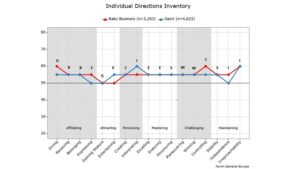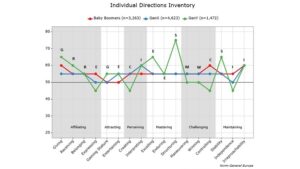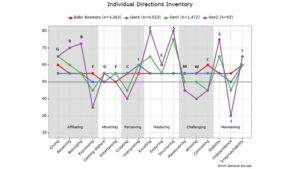
Generational differences – reality versus rumor
The topic of generational differences is one that never seems to go away. There has always been a certain amount of narrative and debate about what the differences are and how they influence organizational dynamics. Yet it is important to bear in mind that generational categories are somewhat arbitrary social constructs and that shifting patterns of motivation and behavior are a natural function of a world that itself is changing rapidly. Furthermore, people’s notion of any given generation is based on stereotyping, subjective perception and untested assumptions.
Millennials, aka Generation Y, are the fastest-growing organizational population globally. Yet how much do business leaders understand about them beyond general perceptions, and what are these perceptions based upon? Are there any empirical data to validate or challenge these assumptions?
One thing is certain – the environment in which people grow up influences their expectations and behavioral norms and, consequently, how they categorize and interpret the behaviors of others. People tend to measure performance relative to their own expectations, and this alone is an important consideration when evaluating generational differences.
In an attempt to provide more factual, specific and measurable information on the topic, Management Research Group conducted a global study of generational differences involving over 23,000 leaders across Europe, North America and Asia- Pacific. The aim of the study was to move beyond the general mythology of generational differences and to identify the exact ways in which motivational characteristics vary.
Research methodology
A total of 23,298 leaders completed the Individual Directions InventoryTM (IDI) assessment. The IDI is an expert psychometric assessment that measures 17 underlying and intrinsic motivational characteristics using a sophisticated semi-ipsative normative questionnaire design. This article presents the findings within Europe (n=9,450) across four generations:
Baby Boomers – mid-1940s to mid-’60s (n=3,263)
Gen X – mid-’60s to late ’70s (n=4,623)
Gen Y – early ’80s to early ’90s (n=1,472)
Gen Z – early ’90s to date (n=92)
The median value of each generation in the 17 motivational scales was calculated and plotted on a line graph. For the purposes of comparability, the data in each of the three global regions were compared against the General European norm (n=5,678). The 17 drivers measured in the IDI are organized into thematic groups (Affiliating, Attracting, Perceiving, etc.) to make it easier to understand key facets of the motivational profile.
There are a few caveats when dealing with generational differences. The research identifies the ways in which the motivation of Millennials varies from that of other generations. But people evolve as they learn and mature, so leaders need to be careful not to create a fixed concept of Millennials upon which important organizational decisions might be based. How different will they be 10 years from now? There is also a degree of variance within the Millennial population (as with other generations), so there will always be a need for some calibration in the way individuals are managed.
Understanding motivational DNA
Before examining the findings of this research, it is important to understand what these data are measuring. In this case, they are measuring intrinsic motivation – that is, the areas in which people derive an internal feeling of satisfaction and personal fulfillment. These characteristics originate from a person’s early years, the first 10 to 12 years being highly influential in shaping their unique motivational profile. Motivation does, however, evolve slowly over time; what people find personally rewarding and fulfilling in their early 20s compared with their 50s is likely to be different in some ways. Life experience, personal growth and broader perspective, among other factors, inevitably contribute to changes in what people find emotionally satisfying as they age.
It is important to note that this research does not measure behavior, so the findings do not describe what different generations do. This is interesting insofar as the only thing that can be observed about others is their behavior, but how much of their behavior reflects them intrinsically, and how much of it reflects the way they adapt to different environments? By measuring intrinsic motivation, the research is getting much closer to the truth of the individual, and in so doing measuring characteristics that are more stable over time and likely to reflect the person more than their context.
Baby Boomers and Gen X (mid-1940s to late 1970s)
Depending on how these generations are defined, together they cover a period from the mid-1940s to the late 1970s, a significant period of time in itself but all the more noteworthy when the degree of social, political and technological change is considered.
The pattern of distribution in Figure 1 clearly indicates that there are relatively minor differences between the median values in intrinsic motivation between Baby Boomers and Gen X. This is perhaps a little surprising considering both the span of time that these generations cover and the degree of change in world affairs. It suggests that it potentially takes a lot to change motivational DNA, or at least that the factors that really influence motivational drivers were not necessarily experienced during this period.
Figure 1: Individual Directions Inventory for Baby Boomers and Gen X
Millennials or Generation Y (early 1980s to early 1990s)
Much has been written about the Millennial generation, not all of it complementary. Time magazine in May 2013 described Millennials as “lazy, entitled narcissists who live with their parents.” While the content of the article was in fact reasonably balanced, in general there seems to be more focus on the negatives than on the positives. It is worth remembering that newer generations are simply different from those that preceded them; whether that makes them better or worse is a matter of opinion.
Millennials have lived through an era of phenomenal technological growth, including the emergence of the internet and social media. Like Generation Z, they have witnessed the relentlessness of global terrorism and unprecedented economic turmoil. The world is an uncertain, informationally overloaded, fast- moving place. Some countries in particular (e.g. Spain, Greece and Italy) are still experiencing the economic repercussions of the global credit crisis; how might this influence the core drivers of those who have grown up in such an environment?
Figure 2 shows key differences between Millennials and their predecessors, bearing in mind that the graph measures motivational DNA, not behavioral characteristics. Millennials have higher expectations of achievement (Excelling), bringing a greater sense of urgency to accelerated growth and career progression. Interestingly, there is strong evidence to suggest less originality in this generation than the stereotype might suggest. For example, Millennials are more motivated by a world that is safe and predictable (Stability) and less by environments that require them to innovate and to think in more lateral terms (Creating). This flies in the face of many preconceptions about this newer generation, particularly considering their immersion in new technology. But are they truly the originators, or merely the consumers of innovation?
Figure 2: Individual Directions Inventory for Baby Boomers, Gen X and Millennnials
The elevated median score on the Structuring scale is the most dramatic feature. This scale measures the extent to which the individual enjoys working in a manner that is meticulous, precise and systematic. It also indicates that more clarity about process and “how to” is critical for this generation, and that there might be the first signs of more compulsive tendencies emanating from this underlying motivational characteristic. The graph also indicates less enjoyment from assuming command (Controlling) or from working in a more autonomous, self-reliant manner (Independence). These point strongly toward a preference for more democratic, inclusive decision-making processes and a facilitative approach to leadership.
Motivational measures in themselves describe what people find personally satisfying and rewarding, so they can appear to be a very positive type of construct. But motivational drivers can easily conflict with each other, and often do. For example, some people are motivated by success and security at the same time, so the desire to achieve comes with an elevated fear of failure. This newer generation wants significant achievement (Excelling) with less inherent risk (Stability), and wants to do so in a manner that requires less self-sufficiency (Independence). Previous generations, particularly those whose work ethic revolves around “serving one’s time” and earning the right to be successful, might not appreciate these characteristics.
Practical steps for working with Millennials
Comparatively speaking, Millennials have a more significant informational need than their predecessors. They clearly like to be kept in the loop, finding an ongoing flow of information reassuring as well as informative. They also like to understand the “how to,” reflecting their need for others to be granular and specific in their instructions. They are likely to feel uncomfortable in “last-minute” scenarios, preferring some degree of advance notice to an extent that might be underestimated by others. If previous generations are unaware of these variances, it makes it more difficult for them to make good behavioral choices and to calibrate the ways in which they keep newer generations informed (and vice versa).
The same approach can be applied to other themes such as expectations and sensitivities in relationships. For example, Millennials (and Gen Z even more so) are more likely to be sensitive to situations in which they feel unsupported (Receiving). Newer generations also appear to manifest a greater degree of caution (higher on Stability and Structuring, lower on Creating), which suggests that they will be more comfortable driving innovation when they can do so collectively and with input and validation from others.
This research, especially the empirical measurement that it is based upon, provides practical insights and objective evidence about how to lead, manage and motivate employees across generations. Leaders would do well to act on the following guidelines:
- Be aware that a faster pace of progression and learning is important. Millennials have very high expectations of achievement, both in extent and pace. Establishing a clear career path, developmental stages and criteria for progression helps in this process. Be tangible and specific, not conceptual.
- Foster a more inclusive and democratic environment. Newer generations work best when they collaborate and exchange information and ideas continually. They are likely to feel less secure when they have to work autonomously, and may hold off making a decision until they have satisfied their higher level of informational needs.
- Avoid a “command and control” approach to leadership – it doesn’t work. A more facilitative style is more likely to coax the best out of Millennials; they are a highly motivated group so there is a great deal of positive energy to tap into. Delegate ownership, not just task. Keep a supportive eye on progress and provide ongoing feedback. Develop your “leader as mentor/coach” skills.
- Set clear expectations from the outset. Providing context, explaining method and defining objectives will make a positive difference. As before, be tangible and specific, not conceptual. Leave the door open to allow Millennials to double-check things as they execute.
- Provide ongoing support. Although previous generations might interpret supervision as micromanagement, Millennials are more likely to interpret it as support. They also expect more immediate access to information and support. They might feel more comfortable finding out for themselves if they can use a technology platform to support their learning or to provide immediate access to critical information.
- Develop an understanding of motivational characteristics. By being aware of their own expectations and biases and using a methodical approach to measuring motivation, leaders can try to bring the best out in others irrespective of their generational origin.
Looking ahead to Generation Z (early 1990s to date)
The changing patterns of motivation described above are intriguing in themselves, but are they one-off variances, or do they represent a specific trajectory that continues into the post-Millennial generation? Generation Z represents a much smaller population, both in this research study and in organizations in general, but it is worth including, if only to see where the motivational direction is heading.
The purple line in Figure 3 represents Generation Z; these findings are quite extraordinary and provide an early indication that the variance observed between Millennials and previous generations is not simply random. Something more fundamental is changing in motivational dynamics. What the causal factors are remains an open question; these results, particularly their consistency, are unlikely to be arbitrary. Therefore, a reasonable assumption is that something is happening environmentally that is propagating an unprecedented degree of change in motivational drivers. Hence the need for leaders to keep the focus on understanding generational differences and to adopt a more nuanced and thoughtful leadership style in the quest to enhance the performance of both individuals and the organization.
Figure 3: Individual Directions Inventory for Baby Boomers, Gen X, Millennnials and Gen Z







![We are all activists [Video]](https://www.imd.org/ibyimd/wp-content/uploads/2024/03/IByIMD-BookClub-RELIVE-March28-IbyIMD-FeaturedImage-5x4-1250x1000-1-720x630.png)
![ACWA Power’s Marco Arcelli: "I’m the Chief Facilitating Officer" [Video]](https://www.imd.org/ibyimd/wp-content/uploads/2024/03/CEODialogue-MarcoArcelli-IbyIMD-Cards-5_3-1250x725-1-720x630.png)
